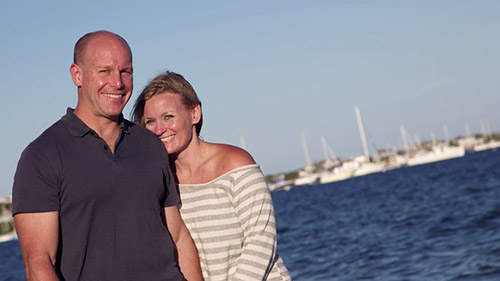Posted by
DCoE Public Affairs from the Defense and Veterans Brain Injury Center on March 30, 2016
In honor of Brain Injury Awareness Month, we are featuring the stories of people who experienced brain injuries and recovered. In this post from A Head for the Future, Brian O’Rourke didn’t realize he had a brain injury until loved ones persuaded him to get help. A video about O’Rourke’s brain injury experience is available on the A Head for the Future web page.
Service members, veterans and their families may carry the stress and confusion of living with a traumatic brain injury (TBI) long before it is diagnosed. Often, family members and friends are the first to notice the signs and symptoms of a TBI and urge their loved one to seek help. Retired Navy SEAL Brian O’Rourke spent months in denial, experiencing behavior changes and having trouble sleeping, before his family and friends persuaded him to find the support that led to his TBI diagnosis.
O’Rourke and his wife, Tammy, share the story of the challenges in their marriage and family life before Brian sought treatment for his symptoms, which included insomnia, irritability and anxiety.
“If you have someone who you love and you believe may have a TBI, please encourage them to go seek help,” Tammy O’Rourke said. “It could be the one single thing that could save your family.”
 Brian and Tammy O'Rourke
Brian and Tammy O'Rourke
After visiting a psychologist on base and undergoing further testing, O’Rourke was diagnosed with multiple concussions incurred through exposure to blasts during training — a common cause of TBI. The diagnosis came as something of a relief, explaining O’Rourke’s behavior and helping his family learn how to cope with the challenges of TBI. Together, they have adjusted their daily life to help O’Rourke manage his symptoms and continue to recover.
Watch the video to see the O’Rourkes tell their story, and see the power of a family that recognized TBI and got help. Share it in your networks to raise awareness that everyone has the power to recognize and recover from TBI.
If you are a family member or caregiver of a service member or veteran with symptoms that indicate a possible TBI, download “Addressing Family Needs,” a free booklet from the Defense and Veterans Brain Injury Center, to learn more about TBI and ways to build stronger family ties, improve communication and more.